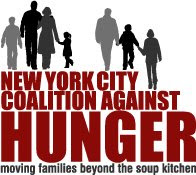“750,000 New Yorkers do not have access to healthy food. That must change,” Manhattan Borough President Scott Stringer said in a press conference in Union Square on Saturday. Joined by advocates from the New York City Coalition Against Hunger and other food justice groups, BP Stringer held the press conference to announce the release of a report entitled “Food in the Public Interest: How New York City’s Food Policy Holds the Key to Hunger, Health, Jobs and the Environment.” This report is the product of an on-going partnership between the BP’s Office and food justice advocates throughout the city who also worked together to plan the “Politics of Food” conference in November at
As the New York Times reported, “Food in the Public Interest” calls for the city to make healthy food more available by supporting farmers’ markets and supermarkets tax through zoning incentives, limiting the proliferation of fast-food restaurants, and supporting local food producers. The media – for example in the Daily News, NBC, 1010 Wins, and Fox – focused on the report’s recommendations on the food shed issue.
However, it is also important to note that the report highlighted “Hunger” as a main policy area, stating that the “need for a food safety net is still relevant in
The report makes several recommendations that assist the Coalition’s on-going advocacy efforts: Lobby for more federal funding for food programs; increase the number of eligible New Yorkers using food stamps; eliminate the existing state and local finger-imaging requirement; expand the number of places where food stamps can be used; and ensure that enrollment is available at soup kitchens and food pantries.
Although the report is only the beginning of an on-going process of engagement between the local government, advocates, and community members, it is an important first step in creating the necessary links between advocacy and policy changes.

No comments:
Post a Comment